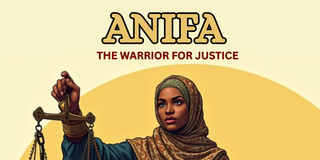Premium
We're not going anywhere, and we won't wait for your permission

In the play Echoes of War, there’s a character called Anifa.
My name is Hanifa Adan. Yes, That Anifa.
In the play Echoes of War, there’s a character called Anifa, and if you’ve watched the play, or even if you haven’t, let’s be clear: she isn’t just a character. She’s a mirror. She is me. She is us.
Today, however, I’m claiming her. Not just because her name echoes mine. I’m claiming her because she did what girls from Butere, and women like me, are taught to fear: she no longer waited for permission to speak. Armed with tech, truth and the terrifying courage to call power by its real name, she didn’t ask for a seat at the table, she built her own. And in that act, I saw generations of women exhale. This isn’t theatre. It’s a blueprint.
Last year, when the youth of Kenya rose up in protest when we logged off passive scrolling and flooded the streets with purpose we weren’t just reacting. We were resisting. We were refusing. We were becoming. And Anifa? She had already scripted that journey. Watching her felt like déjà vu. She reminded us that we don’t need to be politicians to do politics. We need only be fed up enough to stop waiting for change and start being it.
Anifa stands on stage, not just as a character, but as a prophecy. She doesn’t ask to be heard she demands it. She doesn’t follow the rules, so she rewrites them. And that’s precisely what happened when Gen Z took the baton. Not out of rebellion for its own sake, but out of necessity. Out of the understanding that the house is already on fire, and we are the ones with the water.
Live streams
Kenyan youths fight back armed with hashtags, live streams, and receipts. We turn the internet into a weapon, and the streets into a canvas of resistance. We don’t have funding, patronage, or institutional power. We have each other.
And we have a purpose.
In just four hours, we raised 14 million Kenyan shillings. By the end, over 30 million had been pooled by ordinary people, giving whatever they had to support strangers who had bled beside them in protest. We paid medical bills. We buried our dead. We ensured no one was left to suffer alone in hospital corridors or lie cold in a morgue because their family couldn’t afford the paperwork.

That wasn’t charity. That was solidarity. That was Anifa.
She is the girl who refuses to sit quietly in the corner of power. She’s the spirit of a generation that won’t be muted. And Kenya felt her pulse in every protest last year.
She reminded us that we can cry and still organise. Grief and strategy are not opposites, they’re twins.
Anifa’s revolution was not passive. Neither was ours.
And what I still carry with awe is the refusal of Butere Girls and other students to perform when the Ministry tried to censor their voices. Butere Girls were meant to perform Echoes of War and instead, they stood still, sang the national anthem, and walked off stage.
That act, that refusal, that anthem, they were louder than any performance could have been.
They had rehearsed for months. They had prepared to shine. But when the moment came, they sacrificed all that for a principle: If some of us can’t speak, then none of us should. They chose unity over applause. Justice over trophies. And they weren’t alone. School after school followed. Students who had poured their hearts into their craft said no. Not like this.
What those students did was a lesson in solidarity that many adults, especially in positions of power, have yet to learn. It was a declaration: none of us is free until all of us are.
This spirit, the one that Anifa embodies, the one that lived in Butere, the one that lit up Kenyan streets and Twitter timelines, is what I’m writing about. It's not fiction. It’s a living, breathing rebellion.
Political elite
Kenya’s political elite would prefer that we didn’t notice these things. That we stayed in our place. That we took our exams, posted filtered photos, and left governance to the old guard. They want us to believe that we are too young to understand. But we’ve seen enough to know this: if youth are old enough to die in the streets, we’re old enough to lead.
They say we shouldn’t “politicise everything.” But what’s more political than children dying from hunger while budgets balloon for luxury cars? What’s more political than student loans that chain our futures while politicians disappear with billions? What’s more political than tear gas thrown at kids in uniforms?
If politics is everywhere, then so is our resistance.
Anifa, like the Gen Z movement, isn’t waiting for permission. She isn’t asking for a seat at the table. She’s flipping the whole table over. And it’s not because we want chaos; it’s because the table was already rotting. Kenya’s youth are not satisfied with the status quo because the status quo has never served us. We are not interested in being tokens in anyone’s political theatre. We want real change and we want it now.
We are breaking the patronage mould. Kenya’s traditional politics thrives on tribal alliances and backdoor deals. It’s all about who knows who, which village you’re from, and who owes who a favour. But Gen Z doesn’t care for that. We care about justice. We care about integrity. We care about results. And because we weren’t raised by the system, we’re not loyal to it. That’s terrifying for the establishment. But it’s necessary for Kenya.
We’re digital natives. We’re multilingual in code, meme, and mobilisation. We know how to trend a cause, raise a million, and shame a government, all in the same day. That makes us dangerous to a system built on silence and slowness.
But we don’t want to burn everything down. We want to build better. And Anifa reminds us that we can. She didn’t just tear things apart, she revealed them. She didn’t just expose corruption, she demanded a new way of being. And that’s what Gen Z is doing: we are creating systems of care in the ruins of state neglect. Legal aid desks. Medical response teams. Verified fundraisers. Shared grief, organised hope.
Demographics don’t lie. The youth population in Kenya is too big to ignore. Too bold to silence. And too united to be divided. Any strategy that doesn’t centre us is a strategy on borrowed time.
Anifa is more than a character. She’s a warning. A prophecy. A reminder that the future doesn’t belong to those who wait, it belongs to those who claim it. And we are claiming it. Not just in protest. Not just in plays. But in policy. In poetry. In purpose.
So to those in power, those still clinging to the old rulebook: We are not waiting for your permission. We are already here. And we are not going anywhere.





